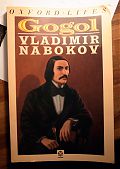
Vladimir Nabokov
Gogol
Pronounced:
“Gaw-gol,” not “Go-gall.” The final “l” is a soft dissolving “l” which does not exist in English. One cannot hope to understand an author if one cannot even pronounce his name.
Nabokov’s thin biography on Nikolai Gogol is less biography and more quirky treatise written by one writer about an admired writer. “Admired” is a weak word: Nabokov exalts in Gogol’s strange genius. He does not laden his book with facts about Gogol’s life but succinctly sets out his impressions of Gogol’s works. In short, Gogol is a perfect little book, and necessary for anyone who has also exalted in Gogol’s strange genius.
The book begins with Gogol’s death and ends with his birth. He starved himself to death, his frail sick body then exacerbated (or tortured) by the bizarre treatments only the 1800’s could perfect. He was 42. The strongest works of masterful genius were few. His first short stories hovered around Ukrainian folklore and folk tradition and folk people. These stories of “local color” leave Nabokov “completely indifferent.”
When I want a nightmare I imagine Gogol penning in Little Russian dialect volume after volume of Dikanka and Mirgorod stuff of ghosts haunting the banks of the Dnieper, burlesque Jews and dashing Cossacks.
I have never made it through one of those “Ukrainian Tales,” preferring to read The Overcoat, The Portrait, The Nose again and again. (If I had Dead Souls, I would be re-reading it now.) Nabokov focuses on three of Gogol’s works: The Government Inspector (a play), Dead Souls and The Overcoat, briefly. He intersperses his own translations throughout and vociferously criticizes the available translations, overly frustrated by the disregard of Gogol’s very signature nuances. Nabokov does not praise his translations either, but says they are more faithful to the Russian originals.
It is impossible to pin-point Gogol’s writing. His writing is strange and dream-like with morphing dream sensibilities; the effects of his stories are circular. Not even Gogol could explain himself. When he tried to interpret his own The Government Inspector, he does so quite literally, a “depressing” account, according to Nabokov. Nabokov’s observations are perfect to advance one’s readings of Gogol, while still leaving enough room for personal thoughts and wonderings as to where Gogol draws them.
The oddest thing about Gogol is Gogol himself.
No wonder St. Petersburg revealed its oddity when the oddest Russian in Russia walked its streets.
He travelled Europe sporadically, from town to town without geographical reference. After writing the first part of Dead Souls, he converted to a perverse religiosity which destroyed his creative ability; the devilish sides of his characters were preached out of him, leaving him with nothing. Nabokov thinks it great that Gogol burned the last two parts of Dead Souls a month before his death, for it has been supposed that it was full of efforts to reform dead-soul-collecting Chichikov. Though Gogol did manage to publish his Selected Passages from Correspondence with Friends, a torrent of strange preachings which unleashed an upheaval among his admirers—the famous Belinsky letter, the reading of which Dostoevsky was sentenced corporal punishment in Siberia!
Gogol stands alone in literature. His works reveal the strangeness, the irreality of our lives, as if between everything average there is a crack and way down deep in that crack peering up, is Gogol. Or as Vladimir says:
[His works] appeal to that secret depth of the human soul where the shadows of other worlds pass like the shadows of nameless and soundless ships.
· · · · · · · · · · · · · · · · · · · ·